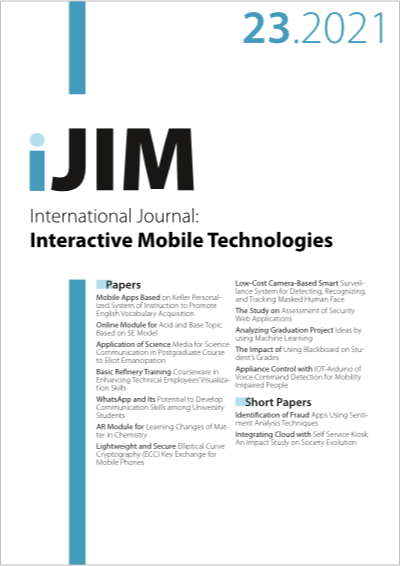WhatsApp and Its Potential to Develop Communication Skills among University Students
DOI:
https://doi.org/10.3991/ijim.v15i23.27243Keywords:
WhatsApp application, communication tool, learning tool, collaboration tool, communication skillsAbstract
Excellent communication skills among graduates are very crucial for their future and career development. WhatsApp application is seen to have the potential to develop these skills since it has robust functions and features, easy to use, and free. However, there are still issues in implementing this application as a tool in developing communication skills by utilizing this application for educational purposes among UTM students. Hence, this study was aiming to investigate the level of WhatsApp usage in education, the level of communication skills by utilizing WhatsApp for educational purposes among students, and their correlations. Student’s perception of using WhatsApp in education was also investigated. This study was based on quantitative research conducted using a survey design, where online questionnaires were distributed randomly among 400 UTM students based on simple random method. Findings showed that there is a high level of WhatsApp usage in education among UTM students and also a high level of communication skills by utilizing this application for educational purposes among UTM students. It was supported by a strong positive linear correlation that existed between these two variables. Students also showed positive perceptions of utilizing WhatsApp in education to develop their communication skills. Therefore, lecturers and students are encouraged to utilize WhatsApp application in education as it can help in fortifying communication skills among students who later become competent graduates that can meet the demand from the industries.
Downloads
Published
2021-12-08
How to Cite
Morsidi, S., Abu Samah, N., Abdul Rahman, K. A., Mohamad Ashari, Z., Jumaat, N. F., & Abdullah, A. H. (2021). WhatsApp and Its Potential to Develop Communication Skills among University Students. International Journal of Interactive Mobile Technologies (iJIM), 15(23), pp. 57–71. https://doi.org/10.3991/ijim.v15i23.27243
Issue
Section
Papers
License
Copyright (c) 2021 Suraya Morsidi, Norazrena Abu Samah, Khairul Anuar Abdul Rahman, Zakiah Mohamad Ashari, Nurul Farhana Jumaat, Abdul Halim Abdullah

This work is licensed under a Creative Commons Attribution 4.0 International License.


